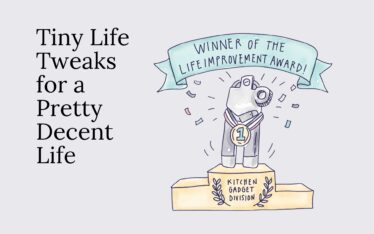The facts of life when we’re kids are pretty tame compared to the facts of life for adults. As kids we learn about the birds and the bees who get to fly around and make whoopee all day (hopefully not with each other — those poor bees), whereas the adult facts of life are a tad more sobering.
“Birth, and copulation, and death. That’s all the facts when you come to brass tacks: Birth, and copulation, and death.” —T.S. Eliot
(T.S. Eliot forgot about taxes. It goes like this: birth, taxes, copulation, taxes, death. And then estate taxes after death.)
This will not be a discussion about taxes, FYI. (Let’s all join in on a collective sigh of relief, right?) No taxes — we’re just going to talk about death!
We’re very aware that we’re careening towards our inevitable demise, but we do one hell of a bang-up job avoiding thinking about it, don’t we? We’re the only animals aware of our temporary-ness and it tends to not sit well with us. Philosopher William James called our awareness of death “the worm at the core” of the human condition for good reason. Despite our morbid curiosity about death, we get crafty and avoid talking about and thinking about and reading about the bitter end. (Except here and now, friend, because you’re sticking with me to the end of this article.)
We grapple with an instinctive yet repressed fear of death, which exists at our deepest, primary levels. You may not think that you have existential angst, but if you’re human, it’s there. Some of us don’t have to scratch the surface too far to find that animalistic fear, and for others we bury our mortal dread deep down under cartons of ice cream, bottles of rosé, endless loops of distracting YouTube videos, and all the other ways we numb our anxieties of not being enough, doing enough, or not being able to live long enough to judge ourselves for not being enough or doing enough.
Death is the wildly unpopular yet ominously present inevitability — and we avoid it more so than a global pandemic, even though it’s the very thing that might help us live like we mean it. Yet the way we approach death or avoid it profoundly impacts our well-being and the ways in which we live our lives.
Denying the idea of death comes at a cost. Despite our valiant attempts to suppress thoughts of “the big sleep,” many experience anxiety, depression, worry and negative emotions; trying to quell death anxiety through avoidance ironically sets the stage for even more anxiety. Denial exacts the price of a compromised inner life.
The most disconcerting trouble with avoiding death is that death always wins. In all of its annoying omnipresence, death isn’t afraid to make itself known — through the news of a terrorist attack, through our own health scares (“how long have you had this mole?”), in the lyrics of a popular song, any Liam Neeson movie, or through someone we know passing away (hello, COVID). We have to work that much harder to put our heads in the sand about our own mortality when others are dropping like flies around us (or singing songs about it). We can try to play dumb, we can try to avoid reality, and yet not one of us will get out of here alive.
Irvine Yalom — my patron saint of existential psychiatry (yes, that’s a thing) — wisely said, “though the fact, the physicality, of death destroys us, the idea of death may save us.”
What do we have to gain by facing the adult facts of life (er, death)? How can death save us?
You and your damned specialness
Let’s start with how we think we’re somehow invincible. Writer William Saroyan famously said, “everybody has got to die, but I have always believed an exception would be made in my case.” (An exception was not granted; he died in 1981.)
Irv Yalom writes about the most common way we deny the idea of death — through the concept of personal specialness. This “conviction that we are exempt from biological necessity and that life will not deal with us in the same harsh way it deals with everyone else” is as irrational as it is predictable.
Bad things happen to other people, and we find ourselves startled when they happen to us. Other people have their cars stolen… not us. Other people get glaucoma… not us. Other people age into wrinkled raisins and ultimately breathe their last breaths, but we somehow think we’ll dodge the ageing bullet and come out… unscathed? With remarkably smooth skin, and somehow immortal? Intellectually we know that’s silly, yet we cling to the idea that we’re special and exempt from experiences all those unfortunate other people have to endure. Sucks to be them!
It’s true that no one else out there is like you — you really are a special snowflake. And you know what happens to snowflakes? They melt.
You are a special, melting snowflake. Beautiful (well, some of you are), but fleeting.
In the sacred Hindu poem called the Mahabharata, this important question is asked: “In all of the worlds what is most wondrous?” The answer? “That no man no woman though they see people dying all around them believes it will happen to them.”
MELTING.
So how do you curb your cockamamie sense of specialness*?
Let’s face the truth about death
Rather than denying or dillydallying around the idea of death, experts recommend that we stoically accept the limitations of being human and the limitations of our bodies — these containers we’ve been given which are destined to perish.
Buddhists believe in the Three Universal Truths:
1. Everything is impermanent and changing.
2. Impermanence leads to suffering, making life imperfect.
3. The self is not personal and unchanging.
If we accept our own impermanence (#1), isn’t it true that it can lead to far less suffering (#2)? Where can you open up and accept impermanence in your life?
Contemplating death provides an opportunity for us to make more powerful choices and lead intentional lives until the reaper comes calling. One way to wake up to life is to quantify your time. Complete this Monday Mornings Calculator to get an idea of how many weeks you have until your end… knowing full well you could blow that number away, and also that you could die tomorrow afternoon.
What do you want to do with your time, now that it’s in such a finite perspective? What ways are you looking to feel more vitally alive? How do you want to add more meaning to your life? What trip have you been longing to take? What relationship have you been curious about rekindling? What talent has sat dormant for years and needs to be exercised again? What changes would you make in your life if you didn’t care what others thought of you?
Let’s stop tiptoeing around death. It’s a fundamental motivator behind why we do what we do, and I don’t know about you, but I need a healthy dose of motivation to do things that are even 3º out of my comfort zone. I AM VERY COMFORTABLE HERE IN MY ZONE, THANK YOU VERY MUCH. It’s only when I focus on the preciousness of my dwindling time that I make life-affirming choices instead of autopilot choices. When I face the real facts of life — which includes the shitty truth that everyone I love and care about will die, including myself — that’s when I come alive. (That might have come out wrong. But you know what I mean.)
Off! Go live like you’ve been warned you won’t live forever.
*An important note about specialness:
It’s true that you are extraordinary, exquisite, and unique. You have talents and traits unlike anyone else out there. You are important and special! Just not special enough to not get old and die. (You may or may not get glaucoma.)







